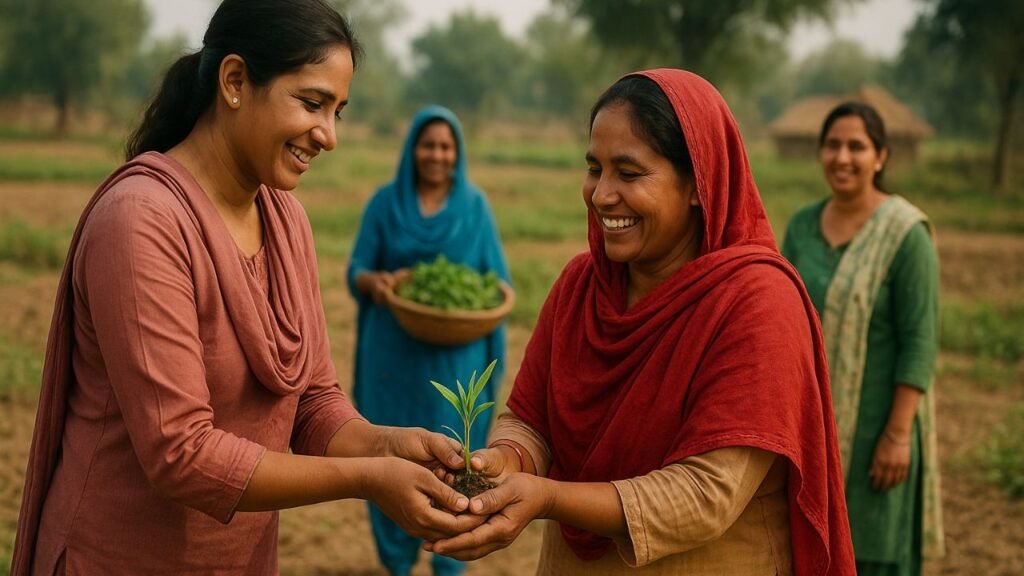Empowering Rural Women – Empowering rural women has become a crucial focus in development initiatives, aiming to bridge gender gaps and promote socio-economic growth in underserved communities. Through targeted livelihood projects, organizations like UN Women and local NGOs are providing rural women with the tools, skills, and resources they need to generate sustainable incomes. These projects often include skill development in areas such as handicrafts, agriculture, food processing, and digital literacy, empowering women to start micro-enterprises or participate in cooperatives. Community participation plays a central role, as women’s engagement in decision-making processes strengthens social cohesion and ensures that development programs are tailored to local needs. By combining training, financial literacy, and access to markets, these initiatives not only enhance individual capabilities but also foster greater economic independence, self-confidence, and social recognition for rural women. Studies by the World Bank show that such empowerment programs significantly reduce poverty levels and improve community resilience.

Importance of Livelihood Projects for Rural Women
Livelihood projects are essential for providing rural women with sustainable sources of income and financial security. These projects often include vocational training, microfinance support, and skill enhancement programs that allow women to develop entrepreneurial abilities and participate actively in local economies. According to IFAD, integrating women into livelihood initiatives ensures that resources and opportunities are more equitably distributed, promoting inclusive growth in rural areas. Participation in income-generating activities also improves women’s status within their households and communities, enhancing decision-making power and access to education for their children. By engaging in cooperatives or self-help groups, women gain collective bargaining power, which enables better market access, fair pricing, and sustainable business growth. Moreover, livelihood projects contribute to building social networks among rural women, fostering knowledge sharing, mentorship, and emotional support. The combination of economic empowerment and community engagement creates a strong foundation for long-term societal transformation, improving both the well-being of women and the resilience of entire rural communities.
Community Participation as a Catalyst for Change
Community participation is a pivotal element in the success of rural development initiatives. When women actively participate in community decision-making, they not only influence the allocation of resources but also gain recognition and confidence in their capabilities. Studies by UN DESA highlight that community-led programs increase program relevance and sustainability, as interventions are tailored to address local challenges and cultural contexts. Women involved in community governance often advocate for better health services, educational facilities, and infrastructure improvements, benefiting entire villages. Participatory approaches, such as village committees and local development councils, provide platforms for women to voice their concerns and contribute to policy formulation. These initiatives also strengthen social cohesion by encouraging collaboration between women and men, creating an inclusive environment for community-driven growth. By promoting both economic and civic engagement, community participation ensures that rural women are not passive beneficiaries but active agents of change, capable of shaping the trajectory of their communities.
 How Zenys Is Empowering Underprivileged Children Through Education and Skill-Building Programs
How Zenys Is Empowering Underprivileged Children Through Education and Skill-Building Programs
Skill Development and Training Programs
Skill development programs form the backbone of women’s empowerment initiatives, equipping participants with marketable abilities that enhance employability and entrepreneurial potential. These programs often include training in handicrafts, agriculture, food processing, tailoring, and digital literacy, tailored to local market demands. Organizations like ILO emphasize that skill development enhances women’s confidence, enabling them to take leadership roles in cooperatives or small businesses. Access to financial literacy training and microcredit facilities allows women to manage resources effectively, invest in business ventures, and achieve economic independence. Mentorship programs and workshops further provide guidance on marketing strategies, product quality, and customer engagement, creating a sustainable ecosystem for rural women entrepreneurs. By investing in skills, these initiatives not only promote income generation but also empower women to become decision-makers in their households and communities, contributing to broader socio-economic development.
Market Linkages and Sustainable Livelihoods
Establishing strong market linkages is critical for ensuring the long-term sustainability of livelihood projects. Women entrepreneurs often face challenges in accessing local and national markets, which limits income potential and business growth. Programs supported by CARE International focus on connecting rural women with buyers, cooperatives, and online platforms, enabling them to sell products at fair prices. These initiatives include guidance on quality standards, branding, packaging, and supply chain management, ensuring competitiveness in wider markets. Sustainable livelihoods also involve promoting environmentally friendly practices and resource management, ensuring that economic activities do not compromise local ecosystems. By combining market access with training and financial support, women are empowered to maintain profitable ventures, support their families, and contribute meaningfully to community development. Ultimately, these efforts enhance not just individual prosperity but also social stability, community resilience, and inclusive rural growth.



